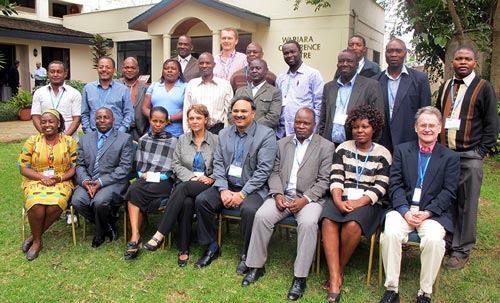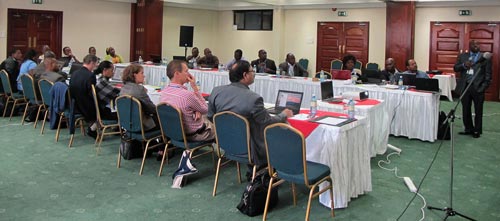By Wandera Ojanji/CIMMYT

The wide adoption of metal silos for grain storage by smallholder farmers in eastern and southern Africa requires the identification of policy gaps, incentives and disincentives and institutional partnerships, according to CIMMYT policy economist Jones Govereh.
Metal silos are effective long-term storage facilities, protecting grain from pests such as grain borers and maize weevils. While lauding the decision of some governments to reduce the corporate tax on farming from 30 percent to 25 percent in 2010, Govereh called on them to include galvanized metal sheets imported solely for grain storage silos under the tax exemptions in place for other agricultural imports. “Farmers are not going to realize the benefits of storage investments without proper policies in place,” Govereh said. “Governments in the region need marketing and storage policies that support a liberalized marketing environment and avoid a maize marketing monopoly, which distorts investments in storage technologies. We also need policies that facilitate better coordination of public-private operations to avoid overlaps and conflicts.”
Govereh spoke during the regional annual review and planning meeting of the Effective Grain Storage for Sustainable Livelihoods of African Farmers (EGSP) Phase-II Project held in Nairobi, Kenya, from 20-21 August. Building on the successes of the previous phase (2008-2011), EGSP-II (2012-2016) is improving food security and reducing the vulnerability of resourcepoor farmers – particularly women farmers – in eastern and southern Africa through the dissemination of metal silos. The project is funded by the Swiss Agency for Development and Cooperation (SDC). The annual review had three main objectives: to evaluate progress, achievements and challenges; to exchange ideas, information and research outputs among CIMMYT, SDC and other key partners; and to plan for the future.
The meeting was attended by implementing partners in Kenya, Malawi, Zambia and Zimbabwe, CIMMYT project staff and SDC representatives. The meeting allowed participants to share ideas and information on implementation, raise awareness on promotion and dissemination of effective grain storage technologies and consult stakeholders on effective post-harvest technologies, policy environment and market issues. The project also held exchange visits to Kenya and Malawi for key partners. Participants shared experiences on project implementation, learned about the project’s impact on smallholder farmers’ livelihoods and discussed challenges. Tadele Tefera, CIMMYT entomologist and project coordinator, praised national teams and partners for achieving research and dissemination targets for the year.

Hugo De Groote, CIMMYT economist, said metal silos have a major impact on farmers’ livelihoods. Those who have not adopted the technology sell most of their maize at harvest (when prices are at their lowest because the supply is at its peak) while adopters sell much of their grain in the fifth month at higher prices, he said. Adopters stored their maize for two months longer than non-adopters and were food secure for one month longer. Vongai Kandiwa, CIMMYT gender and development specialist, noted the importance of mainstreaming gender in the project to minimize the risk of creating, maintaining or exacerbating gender gaps.
Stakeholders also reported several challenges, including an inadequate number of skilled and competent artisans with entrepreneurship skills; lack of fabrication materials; expensive materials; low awareness and knowledge of the technology; and inadequate extension services.To overcome these challenges, stakeholders agreed to boost awareness through promotional events, engage in capacity building of collaborators and strengthen the artisan network. Olaf Erenstein, director of CIMMYT’s Socioeconomics Program, thanked the implementing partners and other stakeholders for their dedication and commitment and SDC for its continued support.
 Climate adaptation and mitigation
Climate adaptation and mitigation 
